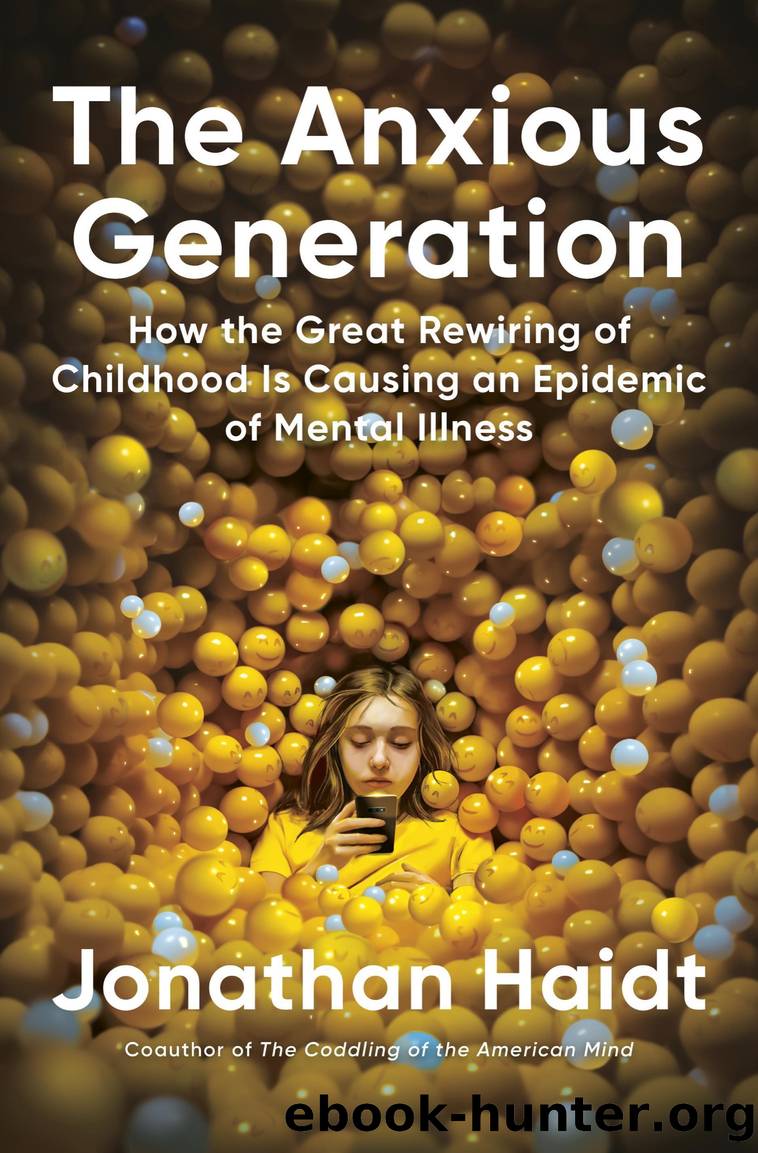The Anxious Generation by Jonathan Haidt

Author:Jonathan Haidt [Haidt, Jonathan]
Language: eng
Format: epub
Publisher: Penguin Publishing Group
Published: 2024-03-26T00:00:00+00:00
2. Raise the Age of Internet Adulthood to 16
In the late 1990s, as the internet was becoming a part of life, there were no special protections for children online. Companies could collect and sell childrenâs data without the knowledge or consent of their parents. In response, the U.S. Federal Trade Commission recommended that Congress enact legislation requiring websites to obtain parental consent before collecting personal information from children. Representative (now senator) Ed Markey, from Massachusetts, drafted such a bill, and he defined a child as anyone under the age of 16, for data collection purposes. The e-commerce companies of that era objected, and they teamed up with civil liberties groups who were concerned that the new bill would make it harder for teens to find information about birth control, abortion, or other sensitive topics.[20]
In the negotiations over the bill, a compromise was reached that the age would be lowered to 13. That decision had nothing to do with adolescent brain development or maturity; it was just a political compromise. Nonetheless, 13 became the de facto age of âinternet adulthoodâ for the United States, which effectively made it the age of internet adulthood for the world. Anyone who is 13, or at least says they are, can be treated as an adult for the purposes of data acquisition. As Senator Markey later said, âIt was too young and I knew it was too young then. It was the best I could do.â[21]
In addition to setting the age too low, the bill, known as COPPA (Childrenâs Online Privacy Protection Act), failed to impose any obligation on companies to verify anyoneâs age. They were only required to avoid collecting data from users when they had direct evidence that the user was under 13. The bill was enacted in 1998, when the internet was a very different place than it is today, and there has been no subsequent action by Congress since then (although several bills are being considered in 2023, including an update of COPPA that would raise the age back to 16).
By specifying 13 as the age of adulthood, COPPA sent a signal to parents that the government thinks 13 is an appropriate age for children to be opening accounts and using these services. It sounds like the âPG-13â by which the Motion Picture Association tells parents that a movie is appropriate for a 13-year-old to see without a parent. But readiness to see a movie is very different from readiness to exercise self-control and make wise choices while being subjected to the addictive attention-extracting techniques used by powerful companies.
What is the right age of internet adulthood? Note that we are not talking about the age at which children can browse the web or watch videos on YouTube or TikTok. Weâre talking only about the age at which a minor can enter into a contract with a company to use the companyâs products. Weâre talking about the age at which a child can open an account on YouTube or TikTok and begin
Download
This site does not store any files on its server. We only index and link to content provided by other sites. Please contact the content providers to delete copyright contents if any and email us, we'll remove relevant links or contents immediately.
| Early Childhood | Parenting Boys |
| Parenting Girls | School-Age Children |
| Single Parents | Teenagers |
The Lost Art of Listening by Michael P. Nichols(6492)
Rich Dad Poor Dad by Robert T. Kiyosaki(5173)
We Need to Talk by Celeste Headlee(4888)
I Love You But I Don't Trust You by Mira Kirshenbaum(3241)
The Complete Idiot's Guide to Coping With Difficult People by Arlene Uhl(2827)
Rich Dad Poor Dad: What The Rich Teach Their Kids About Money - That The Poor And Middle Class Do Not! by Robert T. Kiyosaki(2442)
Life Hacks by Dan Marshall(2161)
Dealing with People You Can't Stand by Dr. Rick Brinkman(2064)
A Burst of Light by Audre Lorde(1985)
An Odyssey by Daniel Mendelsohn(1930)
The Expectant Father by Armin A. Brott & Jennifer Ash(1900)
The Book You Wish Your Parents Had Read (and Your Children Will Be Glad That You Did) by Philippa Perry(1887)
Teach Your Child How to Think by Edward De Bono(1871)
The Out-of-Sync Child by Carol Stock Kranowitz(1779)
No Time to Say Goodbye(1766)
What I Need by J. Daniels(1728)
I Don't Belong to You by Keke Palmer(1677)
The Self-Driven Child by William Stixrud PhD & Ned Johnson(1670)
The 7 Habits Of Highly Effective Teens by Covey Sean(1642)
